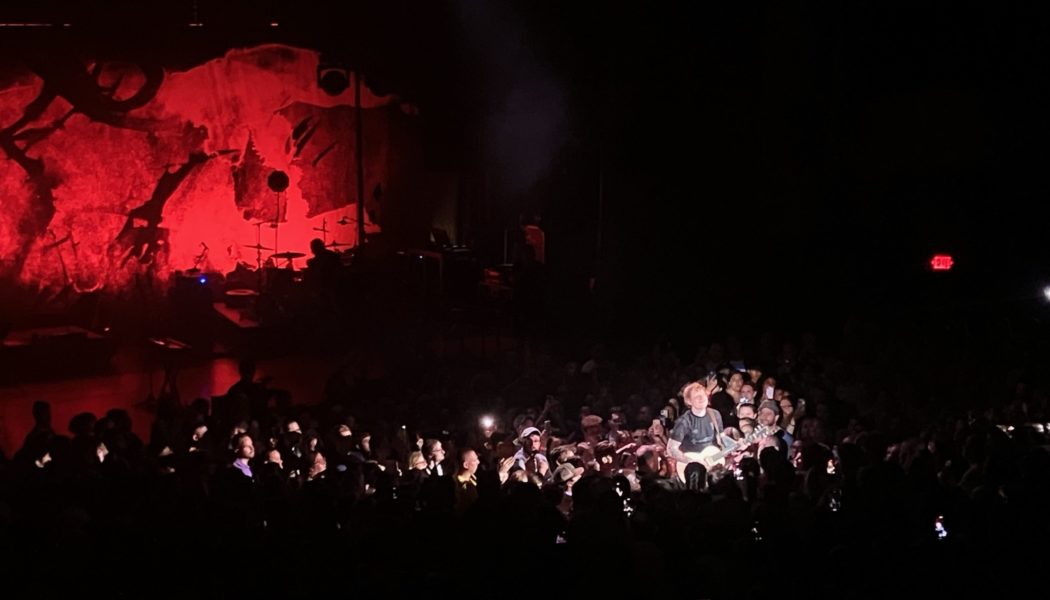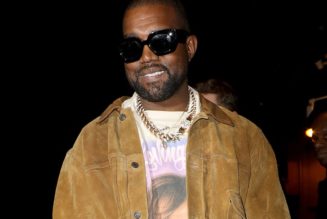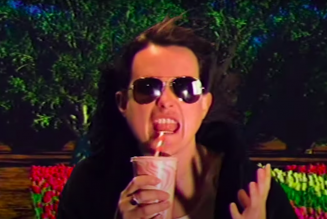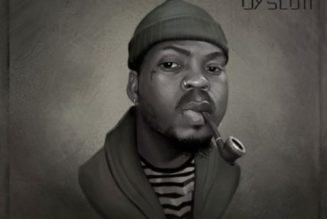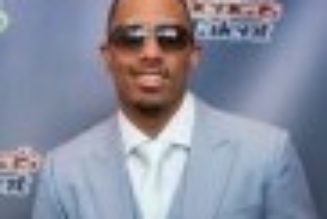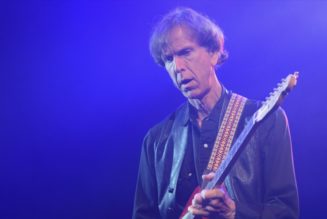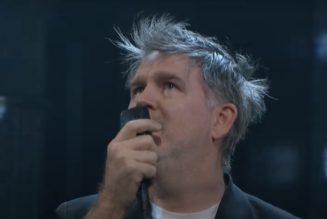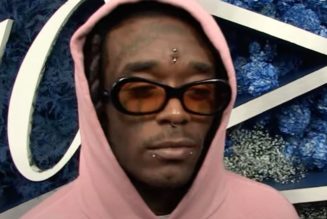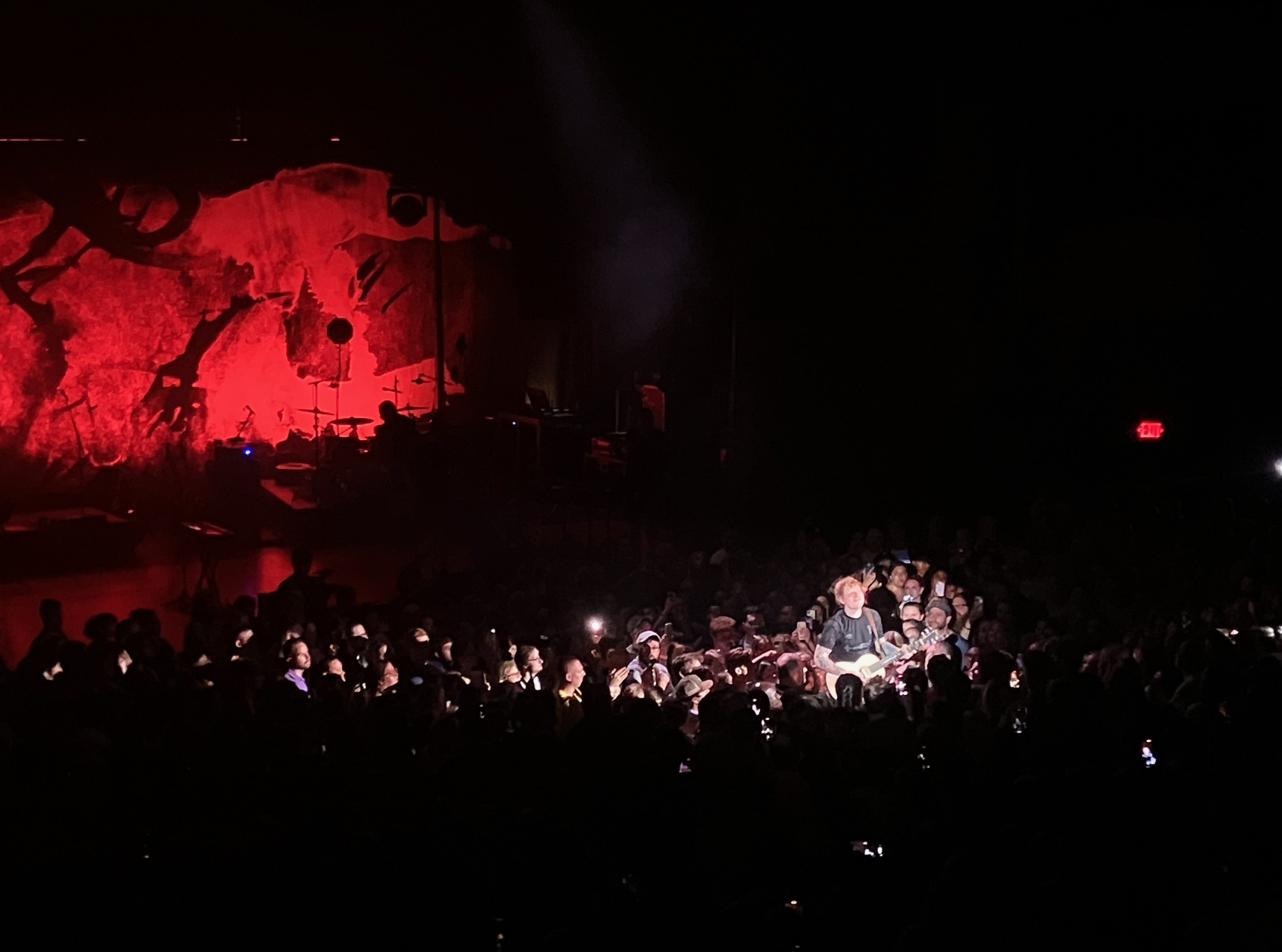
Before he hits the big stage at the Detroit Lions home, singer-songwriter performs small, intimate concert for lucky ticketholders.
At the close of his stripped down, bare bones concert at the Royal Oak Music Theatre on Friday, Ed Sheeran climbed off the stage and plopped himself into the middle of the crowd, where he belted out a pair of songs by himself, no microphone, as fans in the venue’s general admission floor area circled around him.
“Sing with me softly!” he bellowed to the throng of just under 2,000 fans, who joined him in a hushed chorus of “Afterglow” as a warm, communal spirit filled the room.
You won’t get that at Ford Field on Saturday. But that’s the beauty of the English superstar’s current tour, where he’s holding court in a small venue for a lucky group of ticketholders the night before he plays the town’s biggest stadium.
And Friday night’s two hour concert was a cozy, intimate gathering, the 32-year-old Englishman’s smallest local concert to date, in fact. It was the biggest small concert to hit the nearly 100-year-old downtown Royal Oak venue since Adele graced its stage in May 2011, touring behind the release of her album “21.”
The focus of the show was Sheeran’s latest album “-,” or “Subtract,” a downbeat, mostly acoustic affair that deals frankly with themes of grief and loss. Sheeran explained to the crowd that the album, which was released in May, necessitates a scaled down presentation, as its hauntingly personal subject matter won’t necessarily play in a stadium setting in front of a crowd craving hits. “People aren’t lifting weights to these songs,” he said matter-of-factly, with a laugh.
So the crowd was treated to a front-to-back performance of the new album, with lengthy introductions from Sheeran, who explained how a couple of tumultuous events in Feb. 2022 — including the death of his friend Jamal Edwards — inspired several of the songs, including “Eyes Closed” and “End of Youth.” A thread of resilience and renewal colors the album, a kind of if-we-can-get-through-this-we-can-get-through-anything sense of optimism.
For the album portion of the show — the evening was divided into “The ‘Subtract’ Hour” and “The Happy Hour,” the latter featuring hits and catalog favorites — Sheeran was joined by a five-piece band and a six-piece string section, marking his first time touring with a full backing band. (Usually it’s just himself, his guitar and his playback loop pedals.)
The players helped give full-bodied resonance to “Subtract’s” moody sound, and Sheeran was liberal with his microphone time in between songs, telling long stories that made the night feel like a VH1 “Storytellers” session, or an especially talky campfire performance.
He spoke about the album’s structure and how it’s sequenced for its vinyl versions; “Colourblind,” which falls at the album’s halfway point, is meant as a “circuit breaker,” he said, a upbeat track at the end of Side 1 before the hard crash of “Curtains,” which arrives to open the second half of the album.
And he discussed how the National’s Aaron Dessner — a friend of Taylor Swift’s is a friend of Sheeran’s, after all — helped introduce him to a new mode of writing, starting with an instrumental in place and crafting words and melodies around it, which inspired a fruitful day where Sheeran wrote seven songs in full, “Borderline” among them.
If there was a gripe about the evening, it was the loud din of conversation in the audience that could continuously be heard while Sheeran was speaking in between songs. Let’s quickly recap: superstar performer plays a hyper intimate concert, and fans who were fortunate enough to score tickets among the vast sea of hopefuls droned on and on amongst themselves during the show itself about what, “Vanderpump Rules?”
It’s another example of concert crowds behaving badly, or of the civility that seems to have been lost during COVID’s shutdown of live entertainment. We’re so used to watching entertainment on our screens that we’ve forgotten how to interact with a live, in-person performance, and the common courtesy that is supposed to come part and parcel with being an audience member has been replaced by a sense of righteous entitlement. It’s embarrassing at best, disrespectful at worst.
Sheeran, a steady pro, wasn’t rattled in the least, as is expected from a guy who came up playing in every pub and open mic imaginable and who’s now used to playing to stadium crowds.
He finished off the “Subtract” portion of the evening with “No Strings” and “The Hills of Aberfeldy” — the latter was pegged to be “Subtract’s” closer throughout the album’s entire 10-year gestation period, he said — and he rolled into “The A Team,” his 2011 breakthrough single, to kick off the second half of the night.
“The A Team” was the single that first brought Sheeran to Detroit, and he reminisced about his inaugural trip to the Motor City, and how excited he was to be here because of how big of a fan he was of Eminem. The song became an instant singalong for fans, as it represented for many the first time they were introduced to Sheeran’s music.
He brought back his foot pedals and gave a looping demonstration for the crowd, to show how he creates sounds and doubles them back on top of each other to create a full, robust sonic palette with just himself, his guitar, and the tools at his feet.
This is where Sheeran was the most comfortable and in his element, and he rolled through a series of his prized hits — “Shivers” into “Thinking Out Loud,” “Shape of You” into “Bad Habits” — and then closed the 23-song set by jumping down into the crowd for a gentle, a capella “The Parting Glass,” a traditional Scottish song that dates back to the 1770s, and “Afterglow,” the night’s closer, and its spiritual high point.
Ford Field won’t be the same, it will be a different animal, full of huge production, pyrotechnics and all the modern wizardry of today’s mega concerts. Sheeran has proven himself as a performer worthy of that level of staging. But Friday’s performance stripped all that away and showed that underneath it all he’s a singer and a songwriter with a story to tell, and this was a rare, up close opportunity to see him works. Like when Adele came through Royal Oak, it’s not likely to happen again anytime soon.
agraham@detroitnews.com
